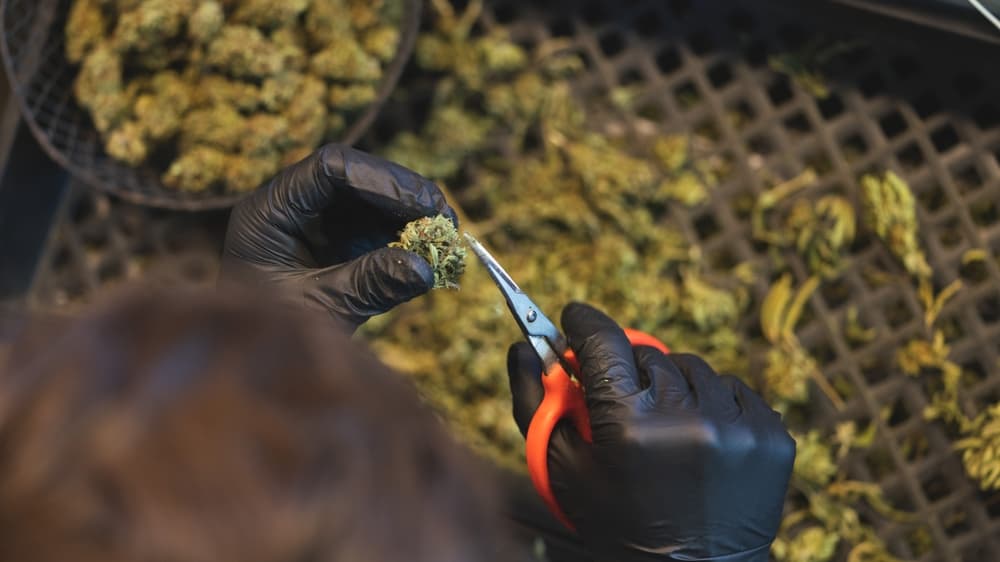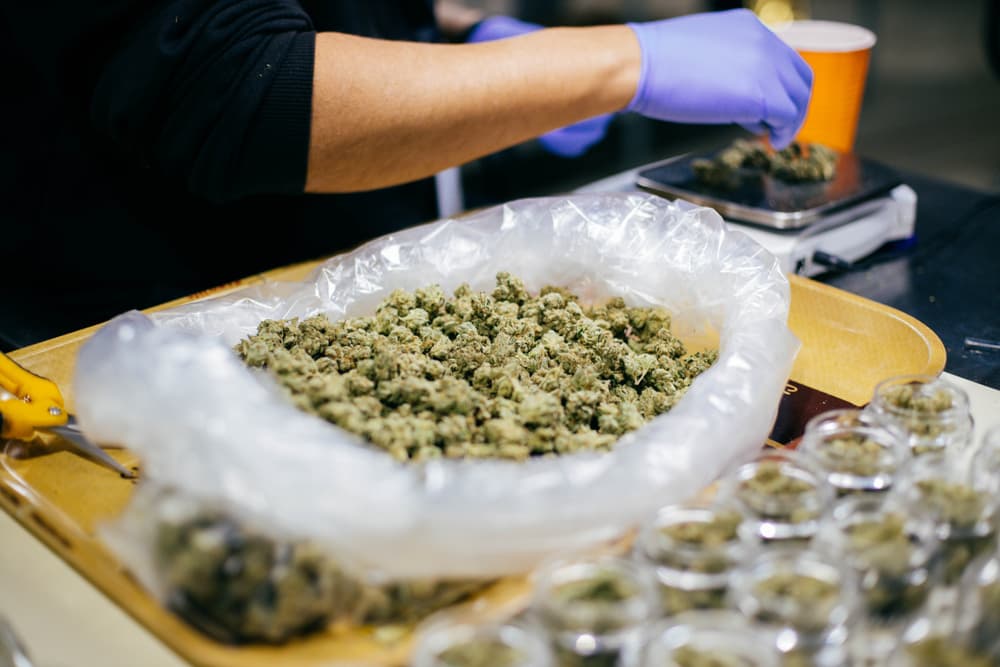In California, drug cultivation and manufacturing are governed under laws like Health and Safety Code Section 11358 (marijuana cultivation) and Health and Safety Code Section 11379.6 (manufacturing controlled substances like methamphetamine or ecstasy).
Cultivating marijuana without a license or exceeding legal limits can lead to felony charges, while manufacturing drugs like meth carries severe penalties, including lengthy prison sentences.
If you face these charges, a skilled California criminal defense attorney can challenge the evidence, question the legality of searches, or use defenses like lack of knowledge or entrapment. They can also negotiate for reduced charges or a plea deal, guiding you through the legal process and working to minimize potential penalties.
Criminal Charges for Drug Cultivation or Manufacturing
In California, drug cultivation and manufacturing are serious criminal offenses with severe penalties. These crimes involve the illegal growing, producing, or distributing controlled substances, such as marijuana, methamphetamine, cocaine, or ecstasy.
Depending on the type of drug and the circumstances, individuals convicted of drug cultivation and manufacturing can face charges, each carrying different levels of severity.
The cultivation of marijuana is one of the most common charges related to drug cultivation in California. While marijuana is legal for recreational use in California for adults 21 and older, cultivating marijuana without the proper licenses or growing more than the allowed limit can lead to criminal charges.
Under California Health and Safety Code Section 11358, cultivation of marijuana is a felony if it involves growing more than six plants for personal use or growing for sale without a proper license. This can lead to imprisonment and significant fines upon conviction.
Manufacturing controlled substances refers to the illegal production of drugs, such as methamphetamine, cocaine, or ecstasy. California Health and Safety Code Section 11379.6 makes manufacturing drugs a felony.
This offense involves activities like producing, refining, or chemically altering illegal drugs, and the severity of the charge depends on the amount of the substance produced and whether the accused has prior convictions.
Possession of chemicals or equipment for manufacturing is another serious offense in California. Even if an individual is not directly involved in drug production, possessing chemicals or specialized equipment used for manufacturing drugs can result in criminal charges.
For example, possessing substances that are commonly used in methamphetamine production, like chemicals used in meth labs, is illegal and can lead to felony charges under Section 11379.6.

In addition, conspiracy to manufacture or cultivate drugs can also lead to criminal charges. If two or more people agree to produce or distribute drugs, they can be charged with conspiracy, which is a felony under California Penal Code Section 182.
A conviction for drug cultivation or manufacturing can result in lengthy prison sentences, hefty fines, and a permanent criminal record. The penalties can vary significantly based on the type of drug, the amount involved, and whether the accused has prior criminal convictions.
An experienced criminal defense attorney in California can navigate the process for you and potentially reduce the penalties or secure a more favorable outcome.
Penalties for Drug Cultivation or Manufacturing in California
In California, a conviction for drug cultivation or manufacturing can lead to serious penalties, depending on the type of drug involved, the amount produced or cultivated, and whether the accused (the defendant) has any prior criminal history.
The state makes these offenses felonies in most cases, and sets severe consequences, including lengthy prison sentences, substantial fines, and a permanent criminal record.
For marijuana cultivation, the penalties depend on the circumstances. If an individual grows marijuana without the proper license or exceeds the legal limit for personal cultivation, they can face felony charges under California Health and Safety Code Section 11358.
Cultivating marijuana for personal use without authorization can result in up to 3 years in state prison. If the defendant is growing marijuana for commercial purposes without a license, the penalties become more severe. A conviction can lead to 3 to 7 years in prison and a fine of up to $500,000.
Manufacturing controlled substances, such as methamphetamine, ecstasy, or heroin, is another serious offense. California Health and Safety Code Section 11379.6 punishes manufacturing drugs with 3 to 7 years in state prison.
The exact sentence depends on the amount of the drug manufactured and the defendant’s prior criminal record.
If the manufacturing involves large quantities of a drug, you can incur severe penalties. Additionally, fines for drug manufacturing can reach up to $50,000.
Penalties can be increased if the offense involves aggravating factors. For instance, if drug manufacturing or cultivation occurs near schools or parks, the defendant may face enhanced penalties. In these cases, the prison sentence can increase.
Additionally, individuals involved in manufacturing drugs in dangerous settings, such as methamphetamine labs, may face charges for endangering public health, which can add more years to their sentence.
Possession of chemicals or equipment used for drug manufacturing is also a criminal offense in California. Under Health and Safety Code Section 11379.6, possessing the materials needed for drug production – such as chemicals used in meth labs – can result in a felony charge. Penalties for possessing such items may include up to 7 years in prison and significant fines.
In some cases, convicted individuals may qualify for probation instead of prison time, particularly if they have no prior criminal record and the offense was nonviolent.
However, even with probation, convicted individuals may still face strict conditions, such as mandatory drug treatment programs, community service, or regular check-ins with a probation officer.
Collateral Consequences Upon Conviction for Drug Cultivation or Manufacturing

A conviction for drug cultivation or manufacturing in California can lead to serious collateral consequences that extend far beyond prison sentences and fines. These additional, often long-lasting effects can affect various aspects of a person’s life.
While these consequences can vary depending on the specifics of the case, certain outcomes are common for those convicted of drug-related crimes.
One of the most significant collateral consequences is the loss of employment opportunities. Many employers conduct background checks before hiring new employees, and a felony conviction for drug cultivation or manufacturing can disqualify an individual from many job opportunities—in particular, jobs in government, healthcare, education, and law enforcement.
Even for positions that don’t require background checks, potential employers may be unwilling to hire someone with a criminal record, which can make finding work much harder.
Another serious consequence is the effect on housing. Many rental properties, especially those managed by larger companies or in certain neighborhoods, have policies that reject applicants with felony convictions. This can make finding a place to live difficult or even result in eviction if the landlord discovers an existing conviction after executing a lease. Those with drug-related convictions may not live in public housing.
A criminal record can also affect an individual’s ability to obtain certain professional licenses or certifications. For example, people convicted of drug crimes may find it difficult or impossible to work as nurses, teachers, or in other regulated professions that require background checks. This can severely limit career prospects and professional advancement.
In addition to these social and economic consequences, a drug conviction can have immigration consequences for non-citizens. Even legal permanent residents can face deportation or denial of citizenship if convicted of certain drug crimes, including cultivation or manufacturing.
This risk can be especially high if the offense involves large amounts of drugs or if the individual has a history of criminal activity.
Lastly, a felony drug conviction can severely damage an individual’s personal relationships. The stigma associated with a criminal record can strain relationships with family and friends and, in some cases, may lead to permanent isolation.
What Are the Best Legal Defenses to a Drug Cultivation or Manufacturing Charge in California?
If you face a drug cultivation or manufacturing charge in California, a skilled attorney may use several legal defenses to challenge the case against you. These defenses create doubt in the prosecution’s ability to prove the charges. Below are some of the best legal defenses lawyers use:
Lack of Knowledge
If you did not know that a person you lived with or rented property to grow marijuana or produce methamphetamine, you can use this defense.
To convict someone of drug manufacturing or cultivation, the prosecution must prove that the defendant knew about the illegal activity. If your attorney can show that you did not know about the drug-related activities, it may lead to a dismissal or acquittal.
Illegal Search and Seizure
The Fourth Amendment of the U.S. Constitution protects you against unreasonable searches and seizures by law enforcement. If the police obtained evidence of drug cultivation or manufacturing through an illegal search – meaning they did not have a warrant or did not follow proper legal procedures – the court may exclude the evidence.
A skilled defense lawyer may challenge the way police obtained evidence, and if they gathered it unlawfully, they may weaken or even eliminate the prosecution’s case.
Entrapment
Entrapment occurs when law enforcement officers induce a person to commit a crime they would not have otherwise committed. If you can prove that the police pressured or coerced you into cultivating or manufacturing drugs, you can use the entrapment defense.
This defense argues that they tricked or forced you into committing the crime, and as a result, you should not face criminal responsibility.
Lack of Intent
Drug cultivation or manufacturing charges often require proof of intent to produce or distribute illegal substances.
If your attorney can argue that you did not intend to manufacture drugs for illegal distribution, this may reduce the charges or lead to a lesser sentence. For example, if you grew marijuana for personal use but police mistakenly believed you grew it for sale, the charges may decrease.
Insufficient Evidence
In some cases, the prosecution simply may not have enough evidence to prove the crime occurred. If the prosecution cannot show that the defendant cultivated or manufactured drugs, a defense attorney may argue that the evidence does not support the charges. This can lead to a case dismissal.
How Can a Criminal Defense Lawyer in California Help with a Drug Cultivation or Manufacturing Charge?

If you are facing a drug cultivation or manufacturing charge in California, hiring a knowledgeable criminal defense lawyer is one of the most important steps you can take to protect your rights and build a strong case.
These charges carry serious consequences, including lengthy prison sentences, hefty fines, and long-term collateral effects.
A skilled defense lawyer can ensure you receive fair treatment, and will work to achieve the best possible outcome in your case.
A criminal defense lawyer will start by thoroughly reviewing the evidence that the prosecution presents. In drug cultivation or manufacturing cases, the prosecution must prove beyond a reasonable doubt that you were involved in the illegal activity.
A knowledgeable criminal defense lawyer will scrutinize the police reports, search warrants, and any physical evidence, looking for weaknesses or inconsistencies. If your lawyer finds weak or improperly obtained evidence, they can file motions to exclude it, which may result in reduced or even dismissed charges.
A skilled criminal defense lawyer will also develop a solid defense strategy tailored to your specific case. For example, if you did not know the drug cultivation or manufacturing activity, your lawyer can argue that you lacked knowledge of the crime, which is a key element for conviction.
Additionally, if the police induced you to commit the crime through coercion or trickery, your lawyer may raise an entrapment defense. The facts of your case will determine your defense strategy, and your lawyer will explore all possible avenues to challenge the prosecution’s case.
In some cases, a criminal defense lawyer can negotiate with the prosecution for a reduced sentence or lesser charges. If the prosecutor presents strong evidence against you, your attorney can secure a plea deal that results in a more lenient sentence, such as probation or reduced prison time, instead of the maximum penalties.
A drug cultivation or manufacturing charge can overwhelm you, but an experienced criminal defense lawyer can guide you through every step of the process.
From filing motions to representing you in court, a lawyer handles your case professionally and efficiently, helping you make informed decisions at every stage.
Speak to an Experienced California Criminal Defense Attorney Today
If you face a drug cultivation or manufacturing charge in California, hire Chudnovsky Law, skilled criminal defense attorneys, immediately. Your lawyer can review your legal options, plan a defense strategy for you, and pursue the best possible result in your criminal case.